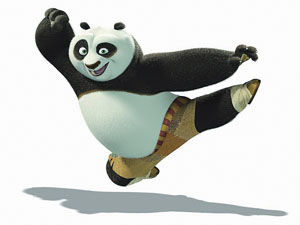
 |
| Kung Fu Panda (File Photo) |
According to Boxofficemojo.com, only two of the 20 highest-grossing martial arts films were made in Chinese, namely Crouching Tiger, Hidden Dragon and Zhang Yimou's Hero. The top players are mostly English-language ones, such as Rush Hour 2 and The Karate Kid (2010).
Crouching Tiger, Hidden Dragon represents a milestone, as well as a special case hard to copy, which sets a bar high for followers.
"Ang Lee was well-known, so was Chow Yun-fat. And the film's marketing techniques were very effective, including the promotion among the young hip-hop community and the attention to word-of-mouth effect," Rosen says.
The film was released first in art-house theaters, but its reviews were so overwhelmingly positive that it entered commercial theaters later.
Other filmmakers have tried to duplicate that success, such as Zhang Yimou, whose Hero was an immediate beneficiary, but none has achieved the same popularity and critical appreciation.
In addition to the language barrier and the US editing, the repetition of genre and visual style also play a hindering role.
While back in 2000 Crouching Tiger, Hidden Dragon was something new to the US audience, they have seen too many imitations, both from China and the US since.
"Martial-arts films are still the most famous genre of Chinese cinema," Rosen says. "But since 2006, the impact of those films is much less, because not only Chinese films, but also many US pictures, are imitating them, too."
And few characters of the Chinese wuxia films are well-remembered by the Western audiences, Rosen adds.
"Characters in Crouching Tiger, Hidden Dragon made a stir, but cinema-goers are mainly young people who find it hard to remember that well a Chinese film's characters 12 years ago."
One way out might be shooting the film in English from the very beginning, or making it a co-production, Jia says.
"But combining the Chinese martial arts into a story accessible to the global audience has a long way to go," he says. "While we have a universal language, we need to explore further on universal values."
Aki Aleong, president of the Media Action Network for Asian Americans, is optimistic. "Wuxia is an easy way to go, because action sells. But Chinese need to make more films that touch people emotionally," he says.
"When more young Chinese filmmakers who study in the US and work in the community go back to China, they will look at filmmaking and marketing them in the West differently and do it more effectively."

















 Beijing police save female hostage
Beijing police save female hostage


![]()
